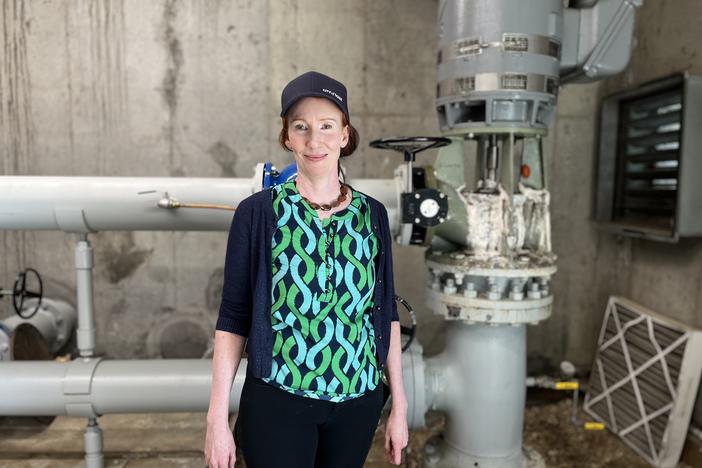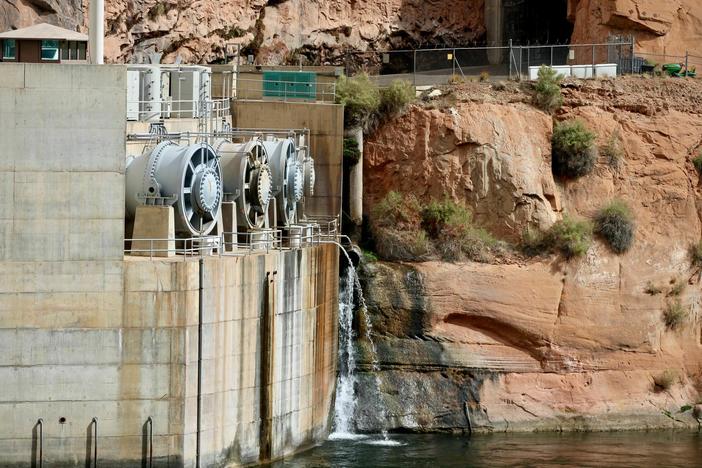Section Branding
Header Content
Cities' Goal To Lower Climate Emissions Could Be Blocked By Gas Utilities
Primary Content
A growing number of cities want to restrict the use of gas in buildings to reduce climate emissions. But many states are now considering laws to block that with backing from the natural gas industry.
Transcript
ARI SHAPIRO, HOST:
In the struggle to slow down climate change, a bitter fight has erupted over natural gas. About half of all Americans use that fossil fuel to heat their homes, but cities with ambitious climate goals are adopting rules that force some developers to build without it, to go all electric instead. NPR's Dan Charles has the second part of an NPR investigation into how the gas industry is fighting back.
DAN CHARLES, BYLINE: Flagstaff, Ariz., is a town with a lot of environmentalists. The city's director of sustainability, Nicole Antonopoulos, says last year the city council passed a climate emergency declaration.
NICOLE ANTONOPOULOS: Which set the Flagstaff community on a path toward reaching carbon neutrality by the year 2030.
CHARLES: And Antonopoulos has been working on a plan for one of the city's biggest sources of heat-trapping gases, the fuel used to heat buildings, including her own home.
ANTONOPOULOS: I have a gas furnace and a gas stove.
CHARLES: For years, the industry sold gas as a relatively clean fuel. But now energy experts like Michael Gartner at the consulting group RMI say its time has passed because burning gas releases carbon dioxide. And if you look at what's required to avoid the worst effects of climate change...
MICHAEL GARTNER: It becomes very clear very quickly that at 2050, we can't have any of that gas at all.
CHARLES: Environmentalists like Alejandra Mejia Cunningham at the Natural Resources Defense Council are pushing an alternative - electrification - because electric heating can be totally clean if that electricity comes from solar and wind and hydro.
ALEJANDRA MEJIA CUNNINGHAM: We have the technology. It's really one of the more cost-effective, least-regrets strategies we have available.
CHARLES: In California, dozens of communities are now forcing builders to go all electric. They're not allowing gas hookups for most new buildings. And about a year ago, Nicole Antonopoulos says Flagstaff was thinking of doing the same thing.
ANTONOPOULOS: That was one of our strategies. Could we say no new - no natural gas and new construction?
CHARLES: At exactly the same time, though, the gas industry was preparing a counterattack. At a meeting of the American Gas Association's executive committee in December 2019, the group's CEO, Karen Harbert, called these moves by cities a challenge for the industry. An environmental group, the Climate Investigation Center, obtained a document describing this meeting, and it describes a new industry initiative to fight those municipal ordinances. Half a dozen gas companies were involved, among them Southwest Gas, the biggest gas provider in Arizona. In February of 2020, a senior member of the Arizona legislature who'd received political contributions from Southwest Gas introduced a bill that made it illegal for cities to limit gas hookups. Republicans lined up to support it. Here's Representative Mark Finchem from Tucson.
(SOUNDBITE OF ARCHIVED RECORDING)
MARK FINCHEM: We have been able to observe what happens in cities like Berkeley, Calif., that take these radical steps to tell people, this is what you will use, whether you like it or not.
CHARLES: The bill sailed through the legislature. It was signed within a month. After that, the gas industry expanded their campaign. Here's one of the top lobbyists for the American Gas Association, George Lowe, on a conference call with industry colleagues in November.
(SOUNDBITE OF ARCHIVED RECORDING)
GEORGE LOWE: We have run pro-gas choice legislation in Arizona, Tennessee, Louisiana. So those states - now you can't deny someone natural gas service in their home. We're looking at about 15 or 20 different states to run that in this year.
CHARLES: Bills that block cities from restricting or discouraging the use of natural gas have since been introduced in a dozen state legislatures, including Florida, Georgia, Utah and Kansas. Jasmin Moore is the sustainability director for Lawrence, Kan., which has set a goal of 100% renewable energy.
JASMIN MOORE: It really seems like it's intended to slow down our progress.
CHARLES: Moore and officials in other cities say it's not exactly clear what the proposed laws will allow cities to do, so they're getting creative - recruiting allies for electrification. In Salt Lake City, that includes a construction company.
TYLER HOLLON: This is our, like, sixth all-electric apartment building that we've done.
CHARLES: Tyler Hollon with Wadman Corporation is showing off a six-story structure, framed but not yet finished. It's intended for affordable housing, so it had to be built affordably, too. Hollon says his company only did its first all-electric building because an environmentally-minded developer forced them to. They thought it would cost a lot extra - turns out it's cheaper.
HOLLON: You eliminate new gas taps. You eliminate running all those gas lines through your building.
CHARLES: Instead of a gas furnace in each unit releasing exhaust into the air, there's an electric heat pump on the wall - super-efficient heating and cooling. When electricity comes from renewables, it'll be great for the climate. In the meantime, it makes the city's air cleaner.
HOLLON: We just want everybody to do it. I mean, it's everybody's air that we're all breathing. It makes my mountain bike ride that much easier.
CHARLES: His company is now sharing its blueprints and budgets with other builders. If the city government can't drive electrification, maybe those numbers will do the job.
Dan Charles, NPR News. Transcript provided by NPR, Copyright NPR.
Bottom Content



